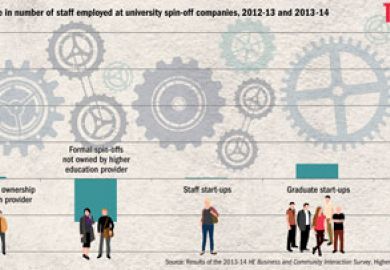The benefits for universities of partnering with social enterprises may not be “fully understood”, despite the fact that three-quarters of institutions are actively involved with such collaborations, according to an international survey by the British Council.
The report, Social Enterprise in a Global Context: The Role of Higher Education Institutions, is based on a survey of more than 200 higher education institutions across 12 countries in four continents, conducted by Plymouth University.
The study defined “social enterprise” as businesses that trade for a social purpose rather than simply to maximise profits for owners and shareholders, and added that university engagement with such companies could include providing placements for students, creating opportunities for students and staff to develop their own social enterprises, and inviting social entrepreneurs to serve as student mentors.
The survey found that 75 per cent of institutions are actively involved with at least one social enterprise and more than half of these are also engaged in an international social enterprise partnership. Almost a fifth of universities (19 per cent) intended to work with a social enterprise, while just two per cent had never worked with such a business.
However, the report, which was launched at the British Council’s Going Global conference in Cape Town on 5 May, found that the biggest challenge for institutional engagement with social enterprise was lack of funding, “predominantly related to the cost of staff time and resource”. The report suggested that this may mean that the “institutional benefits of social enterprise partnerships are not fully understood”. Potential benefits highlighted in the study include enhanced university reputation, increased networking opportunities and diverse employment prospects for students.
Of those universities not currently working with social enterprises, the main reported barrier was a lack of knowledge and experience regarding approaches to engagement. However, three-quarters (75 per cent) of institutions from this group said that they would be encouraged to engage if they received support such as training or mentorship programmes, while 73 per cent said that they would be motivated to do so if funding were available.
The report also found that levels of university engagement with social enterprise varied by country, with all institutions surveyed in Hong Kong and Kenya, and 89 per cent of universities in the UK, stating that they are currently working with these types of businesses. Pakistan was the least engaged of the countries surveyed, with just 45 per cent of institutions currently engaged with social enterprises.
The report added that while most of the universities surveyed stated that they had assessed the impact of individual projects, there was little evidence of this activity taking place at an institutional level. It recommended that senior “social enterprise champions” at universities could “bring further credibility to staff working in this area”.
Register to continue
Why register?
- Registration is free and only takes a moment
- Once registered, you can read 3 articles a month
- Sign up for our newsletter
Subscribe
Or subscribe for unlimited access to:
- Unlimited access to news, views, insights & reviews
- Digital editions
- Digital access to THE’s university and college rankings analysis
Already registered or a current subscriber?




